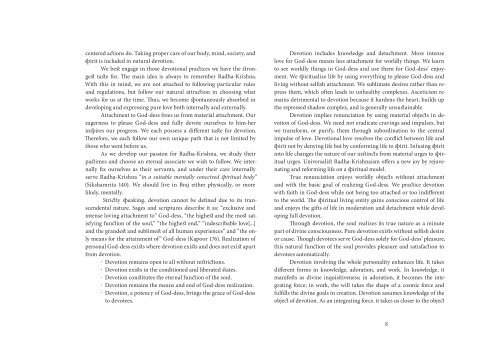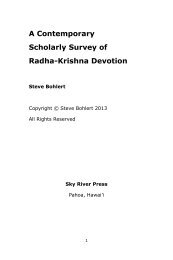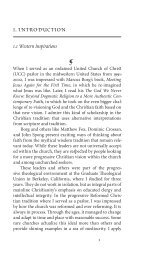The Way of Natural Devotion - Universalist Radha-Krishnaism
The Way of Natural Devotion - Universalist Radha-Krishnaism
The Way of Natural Devotion - Universalist Radha-Krishnaism
Create successful ePaper yourself
Turn your PDF publications into a flip-book with our unique Google optimized e-Paper software.
centered actions do. Taking proper care <strong>of</strong> our body, mind, society, and<br />
spirit is included in natural devotion.<br />
We best engage in those devotional practices we have the strongest<br />
taste for. <strong>The</strong> main idea is always to remember <strong>Radha</strong>-Krishna.<br />
With this in mind, we are not attached to following particular rules<br />
and regulations, but follow our natural attraction in choosing what<br />
works for us at the time. Thus, we become spontaneously absorbed in<br />
developing and expressing pure love both internally and externally.<br />
Attachment to God-dess frees us from material attachment. Our<br />
eagerness to please God-dess and fully devote ourselves to him-her<br />
inspires our progress. We each possess a different taste for devotion.<br />
<strong>The</strong>refore, we each follow our own unique path that is not limited by<br />
those who went before us.<br />
As we develop our passion for <strong>Radha</strong>-Krishna, we study their<br />
pastimes and choose an eternal associate we wish to follow. We internally<br />
fix ourselves as their servants, and under their care internally<br />
serve <strong>Radha</strong>-Krishna “in a suitable mentally conceived spiritual body”<br />
(Sikshamrita 140). We should live in Braj either physically, or more<br />
likely, mentally.<br />
Strictly speaking, devotion cannot be defined due to its transcendental<br />
nature. Sages and scriptures describe it as: “exclusive and<br />
intense loving attachment to” God-dess, “the highest and the most satisfying<br />
function <strong>of</strong> the soul,” “the highest end,” “indescribable love[...]<br />
and the grandest and sublimest <strong>of</strong> all human experiences” and “the only<br />
means for the attainment <strong>of</strong>” God-dess (Kapoor 176). Realization <strong>of</strong><br />
personal God-dess exists where devotion exists and does not exist apart<br />
from devotion.<br />
· <strong>Devotion</strong> remains open to all without restrictions.<br />
· <strong>Devotion</strong> exists in the conditioned and liberated states.<br />
· <strong>Devotion</strong> constitutes the eternal function <strong>of</strong> the soul.<br />
· <strong>Devotion</strong> remains the means and end <strong>of</strong> God-dess realization.<br />
· <strong>Devotion</strong>, a potency <strong>of</strong> God-dess, brings the grace <strong>of</strong> God-dess<br />
to devotees.<br />
<strong>Devotion</strong> includes knowledge and detachment. More intense<br />
love for God-dess means less attachment for worldly things. We learn<br />
to see worldly things in God-dess and use them for God-dess’ enjoyment.<br />
We spiritualize life by using everything to please God-dess and<br />
living without selfish attachment. We sublimate desires rather than repress<br />
them, which <strong>of</strong>ten leads to unhealthy complexes. Asceticism remains<br />
detrimental to devotion because it hardens the heart, builds up<br />
the repressed shadow complex, and is generally unsustainable.<br />
<strong>Devotion</strong> implies renunciation by using material objects in devotion<br />
<strong>of</strong> God-dess. We need not eradicate cravings and impulses, but<br />
we transform, or purify, them through subordination to the central<br />
impulse <strong>of</strong> love. <strong>Devotion</strong>al love resolves the conflict between life and<br />
spirit not by denying life but by conforming life to spirit. Infusing spirit<br />
into life changes the nature <strong>of</strong> our instincts from material urges to spiritual<br />
urges. <strong>Universalist</strong> <strong>Radha</strong>-<strong>Krishnaism</strong> <strong>of</strong>fers a new joy by rejuvenating<br />
and reforming life on a spiritual model.<br />
True renunciation enjoys worldly objects without attachment<br />
and with the basic goal <strong>of</strong> realizing God-dess. We practice devotion<br />
with faith in God-dess while not being too attached or too indifferent<br />
to the world. <strong>The</strong> spiritual living entity gains conscious control <strong>of</strong> life<br />
and enjoys the gifts <strong>of</strong> life in moderation and detachment while developing<br />
full devotion.<br />
Through devotion, the soul realizes its true nature as a minute<br />
part <strong>of</strong> divine consciousness. Pure devotion exists without selfish desire<br />
or cause. Though devotees serve God-dess solely for God-dess’ pleasure,<br />
this natural function <strong>of</strong> the soul provides pleasure and satisfaction to<br />
devotees automatically.<br />
<strong>Devotion</strong> involving the whole personality enhances life. It takes<br />
different forms in knowledge, adoration, and work. In knowledge, it<br />
manifests as divine inquisitiveness; in adoration, it becomes the integrating<br />
force; in work, the will takes the shape <strong>of</strong> a cosmic force and<br />
fulfills the divine goals in creation. <strong>Devotion</strong> assumes knowledge <strong>of</strong> the<br />
object <strong>of</strong> devotion. As an integrating force, it takes us closer to the object<br />
8







